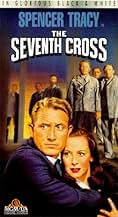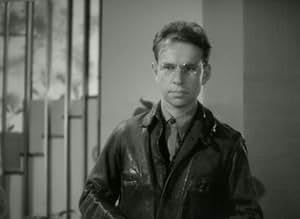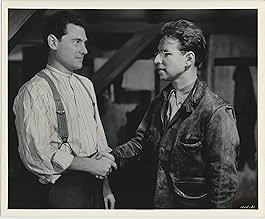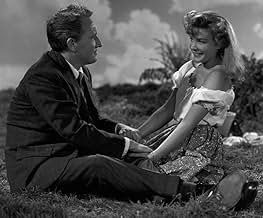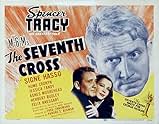IMDb-BEWERTUNG
7,4/10
3228
IHRE BEWERTUNG
Füge eine Handlung in deiner Sprache hinzuSeven men escape from a Nazi prison camp. One makes it to freedom.Seven men escape from a Nazi prison camp. One makes it to freedom.Seven men escape from a Nazi prison camp. One makes it to freedom.
- Regie
- Drehbuch
- Hauptbesetzung
- Für 1 Oscar nominiert
- 3 Gewinne & 1 Nominierung insgesamt
Empfohlene Bewertungen
Seven prisoners escape from a German concentration camp, and the Nazi commander vows to capture and crucify all of them. One by one they are captured in some harrowing scenes and put up on the crosses outside the camp. The seventh cross, already placed, awaits the final escapee - played by a desperate Spencer Tracy. The fear and claustrophobia of being trapped, even as an escapee, inside Nazi Germany is easily seen through Tracy's able eyes. Most notable is the German couple that eventually aids Tracy despite their fear; they are played touchingly by the famous husband and wife team of Hume Cronyn and Jessica Tandy, two of the great actors of our age. Signe Hasso plays a lovely but lonely maid with whom Tracy and she have a touching emotional connection. The hope symbolized by the couple and the maid within the darkness of Nazi Germany is at the core of the film. The issue of Tracy's escape - or non-escape - is almost irrelevant by then: the glimmer of humanity is seen even among the German people. Despite the apparent pessimism of the film, it is optimistic at its heart. And it is charming and beautifully done. Not to be missed.
This film stars Spencer Tracy as a concentration camp escapee named George Heisler who navigates his way to freedom through the perils of Nazi Germany. Along the way he meets many people who help him, and his cynicism and fatigue fade away. Early in the story, soon after he's left the camp, he meets a little girl, and in his mind he's sure that he'll kill her if she attracts the wrong kind of attention to him. Next he lurches into the home of his ex-girlfriend, frightening her. And no wonder, because his face has a twisted expression on it that frightened ME - in this moment Tracy is almost unrecognizable. This man's an animal, he's been through hell and he has no reason to believe that the world is anything other than a sewer. For my money this is a pretty startling opening for a 1944 movie.
Not to throw definitions around too freely, I'm tempted to describe this film as Nazi noir. Heisler weaves his way through German society of 1936, where it's the criminals who are in power, and scuttling through the streets are the folks who are merely trying to survive, in any way possible. At the back of our minds is the worrisome knowledge that things are going to get exponentially worse. Fred Zinnemann, the director, creates an atmosphere of claustrophobia and palpable dread where the night is filled with dark shadows and any tiny act of resistance to the Nazi regime is a colossal act of courage. There is almost no violence in the film, yet the threat of violence hangs heavy in the air. Hume Cronyn and Jessica Tandy play Paul and Liesel Roeder, a couple who are old friends of Heisler and who befriend him. Paul is politically neutral. He doesn't follow the news, and one gets the feeling that he would rather not know anything about what's going on. One of the fascinating threads in the film is his growing awareness. The scenes with Cronyn and Tandy are wonderful - real chemistry is bubbling here and they seem to belong together (and we all know what happened in real life). I must mention that George Macready and Agnes Moorehead are very good in small roles. There's considerable art and intelligence in "The Seventh Cross", and a preview of what was to come in Zinnemann's illustrious career.
Not to throw definitions around too freely, I'm tempted to describe this film as Nazi noir. Heisler weaves his way through German society of 1936, where it's the criminals who are in power, and scuttling through the streets are the folks who are merely trying to survive, in any way possible. At the back of our minds is the worrisome knowledge that things are going to get exponentially worse. Fred Zinnemann, the director, creates an atmosphere of claustrophobia and palpable dread where the night is filled with dark shadows and any tiny act of resistance to the Nazi regime is a colossal act of courage. There is almost no violence in the film, yet the threat of violence hangs heavy in the air. Hume Cronyn and Jessica Tandy play Paul and Liesel Roeder, a couple who are old friends of Heisler and who befriend him. Paul is politically neutral. He doesn't follow the news, and one gets the feeling that he would rather not know anything about what's going on. One of the fascinating threads in the film is his growing awareness. The scenes with Cronyn and Tandy are wonderful - real chemistry is bubbling here and they seem to belong together (and we all know what happened in real life). I must mention that George Macready and Agnes Moorehead are very good in small roles. There's considerable art and intelligence in "The Seventh Cross", and a preview of what was to come in Zinnemann's illustrious career.
A truly outstanding film that has not received the distinction that it deserves, despite a first-rate cast and compelling, as well as unique for the time, subject matter.
Spencer Tracy plays George Heisler, one of seven prisoners escaping from a German concentration camp in 1936. The film traces his attempt to establish contact with the German resistance movement, and along the way he changes slowly from a hardened cynic, and regains his faith in mankind.
This is not a bang-bang action movie. The lack of overt violence is what makes gives the film a searing authenticity. This is based on a novel by Anna Seghers, whose husband was indeed imprisoned in a concentration camp. True, people knowledgeable about the era will find many technical errors. For one thing, all of the actors, including especially Tracy and Ray Collins, are simply too overfed to be believable concentration camp inmates. Also the film shows the SA running the camp, when I do believe the SS was running the camps by '36. I was not especially happy with the handling of the single Jewish character, who is a token character and not portrayed very favorably.
But this was 1944, not 1994, and this was the first film from Hollywood to depict concentration camps. Also I can't think of very many films that have more successfully captured the terror and despair of Nazi Germany, and also more clearly impart a moral message. In that regard it is very faithful to the book.
The performances by all, even the bit characters, are superlative. This was one of Spencer Tracy's finest roles, and supposedly the melancholy of his performance was to a large extent influenced by word that a young friend, who he knew from Boy's Town, had died in combat.
Cronyn and Tandy play Liesl and Paul Roeder, who try to help George Heisler. What makes this a very fine drama is how even secondary and bit characters are shown to change and evolve. Watch for Helene Weigel, wife of Bertold Brecht, playing an old female janitor watching Roeder being taken away in a car. Weigel was the inspiration for Brecht's Mother Courage.
Seghers was a Communist, as are the major characters of the book, and the politics of the author simmers below the surface without being explicitly expressed. Look closely at the characters playing Nazis and concentration camp guards, and generally most of the characters with accents. The majority are refugees from Nazi Germany, adding great authenticity to their performances.
Spencer Tracy plays George Heisler, one of seven prisoners escaping from a German concentration camp in 1936. The film traces his attempt to establish contact with the German resistance movement, and along the way he changes slowly from a hardened cynic, and regains his faith in mankind.
This is not a bang-bang action movie. The lack of overt violence is what makes gives the film a searing authenticity. This is based on a novel by Anna Seghers, whose husband was indeed imprisoned in a concentration camp. True, people knowledgeable about the era will find many technical errors. For one thing, all of the actors, including especially Tracy and Ray Collins, are simply too overfed to be believable concentration camp inmates. Also the film shows the SA running the camp, when I do believe the SS was running the camps by '36. I was not especially happy with the handling of the single Jewish character, who is a token character and not portrayed very favorably.
But this was 1944, not 1994, and this was the first film from Hollywood to depict concentration camps. Also I can't think of very many films that have more successfully captured the terror and despair of Nazi Germany, and also more clearly impart a moral message. In that regard it is very faithful to the book.
The performances by all, even the bit characters, are superlative. This was one of Spencer Tracy's finest roles, and supposedly the melancholy of his performance was to a large extent influenced by word that a young friend, who he knew from Boy's Town, had died in combat.
Cronyn and Tandy play Liesl and Paul Roeder, who try to help George Heisler. What makes this a very fine drama is how even secondary and bit characters are shown to change and evolve. Watch for Helene Weigel, wife of Bertold Brecht, playing an old female janitor watching Roeder being taken away in a car. Weigel was the inspiration for Brecht's Mother Courage.
Seghers was a Communist, as are the major characters of the book, and the politics of the author simmers below the surface without being explicitly expressed. Look closely at the characters playing Nazis and concentration camp guards, and generally most of the characters with accents. The majority are refugees from Nazi Germany, adding great authenticity to their performances.
This one caught me by surprise. It seemed rather formulaic at first, straightforward propaganda to inspire the people back home in the last years of WWII. But as it progressed it became much more, a portrait of German society on the eve of the aggression that started it all. Some elements tended to the melodramatic, especially the romance between Tracy and Hasso. I mean come on, they're confessing their love for each other after barely spending a few minutes together? Frankly Tracy has never been a favorite of mine in his earlier roles. He always tended toward the self-righteous, the arrogant, the visionary with no human frailties.
The narration from Ray Collins, the first escapee to be caught and killed was also on the corny side. Remember he was the first to die yet he's narrating much of the story. That may have worked in 1944 but today that's pretty dated. There are more effective ways to accomplish the same thing. Moreover the pathos in his voice was also a little over the top.
The standout performances here were from Hume Cronyn and Jessica Tandy as a couple from the working class who are enjoying the benefits of National Socialist largess. Their situation perfectly illustrated how the Nazi social programs kept the German workers happy with subsidies and tax advantages. I'm impressed that a film from 1944 dealt with that in an honest and straightforward manner. In my opinion the standout scene is when the Cronyn returns home after being questioned by the Gestapo and finds Tandy sitting at the table in their apartment. She looks up at him and the look on her face goes from surprise to amazement to joy and then she releases all her pent-up emotions and breaks down in uncontrollable sobs as Cronyn tries to comfort her. What a moving moment and what a treat!
The narration from Ray Collins, the first escapee to be caught and killed was also on the corny side. Remember he was the first to die yet he's narrating much of the story. That may have worked in 1944 but today that's pretty dated. There are more effective ways to accomplish the same thing. Moreover the pathos in his voice was also a little over the top.
The standout performances here were from Hume Cronyn and Jessica Tandy as a couple from the working class who are enjoying the benefits of National Socialist largess. Their situation perfectly illustrated how the Nazi social programs kept the German workers happy with subsidies and tax advantages. I'm impressed that a film from 1944 dealt with that in an honest and straightforward manner. In my opinion the standout scene is when the Cronyn returns home after being questioned by the Gestapo and finds Tandy sitting at the table in their apartment. She looks up at him and the look on her face goes from surprise to amazement to joy and then she releases all her pent-up emotions and breaks down in uncontrollable sobs as Cronyn tries to comfort her. What a moving moment and what a treat!
This film has one of the most unusual styles of the day. In many ways, its narration by Ray Collins is very reminiscent of the narration by William Holden in SUNSET BOULEVARD. That's because like Holden, Collins is dead and gives the narration post-mortum! A strange plot device but very effective for this sort of film.
THE SEVENTH CROSS is a propaganda film meant to solidify the people back home in the war effort against Nazi Germany. However, the film is set in 1936--three years before the war began. The film finds seven political prisoners escaping from a concentration camp. The whole "seven crosses" reference regards the Commandant's (George Zucco) pronouncement that each of the seven men will be tracked down and hung from these crosses in the courtyard of the prison until they are dead--as a lesson to all those who would dare to consider escaping.
The main character of the film is Spencer Tracy. What makes this performance interesting is that he says almost nothing through much of the film. Collins narrates and things occur around Tracy, but he's so hollow and beaten by life in the camp that he just stares with a somewhat vacant look. As the film unfolds, his performance opens up as well--showing more and more of the familiar Tracy as he slowly recovers from the agonies of his confinement.
The rest of the cast is quite impressive. Many exceptional character actors (such as Felix Bressart, Hume Cronyn and his wife Jessica Tandy, Agnes Moorehead) were gleaned from the MGM roster for the film. Additionally, if you look at the extended list of the cast, you'll see that it is huge---much, much larger than usual. It's obvious that the studio pulled out all the stops to make this a first-rate production.
Overall, a very successful film because unlike some wartime films, this one is timeless and can be enjoyed and admired today because it is a very well made film--with a taut script and excellent acting. As I said, some wartime propaganda films don't work as well today because they are shrill and simplistic. This film has depth and has more to offer than usual.
THE SEVENTH CROSS is a propaganda film meant to solidify the people back home in the war effort against Nazi Germany. However, the film is set in 1936--three years before the war began. The film finds seven political prisoners escaping from a concentration camp. The whole "seven crosses" reference regards the Commandant's (George Zucco) pronouncement that each of the seven men will be tracked down and hung from these crosses in the courtyard of the prison until they are dead--as a lesson to all those who would dare to consider escaping.
The main character of the film is Spencer Tracy. What makes this performance interesting is that he says almost nothing through much of the film. Collins narrates and things occur around Tracy, but he's so hollow and beaten by life in the camp that he just stares with a somewhat vacant look. As the film unfolds, his performance opens up as well--showing more and more of the familiar Tracy as he slowly recovers from the agonies of his confinement.
The rest of the cast is quite impressive. Many exceptional character actors (such as Felix Bressart, Hume Cronyn and his wife Jessica Tandy, Agnes Moorehead) were gleaned from the MGM roster for the film. Additionally, if you look at the extended list of the cast, you'll see that it is huge---much, much larger than usual. It's obvious that the studio pulled out all the stops to make this a first-rate production.
Overall, a very successful film because unlike some wartime films, this one is timeless and can be enjoyed and admired today because it is a very well made film--with a taut script and excellent acting. As I said, some wartime propaganda films don't work as well today because they are shrill and simplistic. This film has depth and has more to offer than usual.
Wusstest du schon
- WissenswertesFirst joint film appearance of real life couple Hume Cronyn and Jessica Tandy.
- PatzerWhen the escapees are being hunted, the only uniformed personnel we see chasing them are the 'Storm troopers' (Sturmabteilung) or SA. Even before the 'night of the Long Knives', the SA would not have been the only group to search for escapees & by 1936, the hunt would also have been carried out by the regular police and the Schutzstaffel (SS).
- Zitate
George Heisler: There are no better men than Paul Roeder.
- Alternative VersionenThere is an Italian edition of this film on DVD, distributed by DNA srl, "LA SETTIMA CROCE (1944) + THE SEARCH (Odissea tragica, 1948)" (2 Films on a single DVD), re-edited with the contribution of film historian Riccardo Cusin. This version is also available for streaming on some platforms.
- VerbindungenFeatured in Twenty Years After (1944)
Top-Auswahl
Melde dich zum Bewerten an und greife auf die Watchlist für personalisierte Empfehlungen zu.
- How long is The Seventh Cross?Powered by Alexa
Details
Box Office
- Budget
- 1.300.000 $ (geschätzt)
- Laufzeit1 Stunde 52 Minuten
- Farbe
- Seitenverhältnis
- 1.37 : 1
Zu dieser Seite beitragen
Bearbeitung vorschlagen oder fehlenden Inhalt hinzufügen

Oberste Lücke
By what name was Das siebte Kreuz (1944) officially released in India in English?
Antwort

